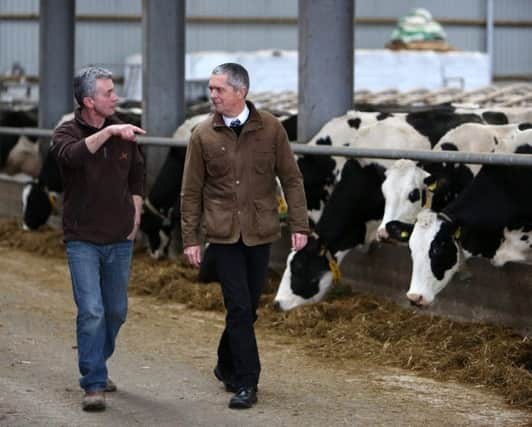Q&A: NFU vice president Guy Smith answers our questions


With much of British agricultural exports going to the EU, what do you think of Prime Minister Theresa May’s intentions to leave the Single Market?
She is coming over as a strong leader which I think is right for these times. The country needs strength at the top but she has set government a huge workload with the prospect of a hard Brexit in two years. The work to bring EU legislation into UK law and negotiating trade deals with hundreds of countries is enormous, if not impractical, and the job of the NFU is to make sure the industry isn’t overlooked.
Advertisement
Hide AdAdvertisement
Hide AdWhen we have animal welfare hanging over us as livestock producers, our trade negotiators have to recognise this is an unusual industry. Because of these types of things, we can’t blunder into trade deals with lower animal welfare standards. As the Secretary of State has said, we have the third highest animal welfare standards in the world. British farmers are proud of their high standards and don’t want to see them watered down. We will always remind consumers about those high standards and hope they will stand by us in making British food their first choice on the supermarket shelf.


Are you frustrated by the time it is taking the government to come forward with ideas for British agriculture post Brexit?
We were very split as an industry on this issue and it may be difficult for us to represent a fundamentally split membership. The sooner we have a clear heads up as to the way the government is thinking, the sooner we can get our house in order as an NFU.
I always thought before the June 23 decision we were a robust organisation in terms of our finances, that we had some rainy day funds and now we are using those rainy day funds to invest in the organisation because the demands on the NFU are going up and we will be ready for this. The mechanisms are clear in that the government will publish a green paper, then a white paper and an agriculture act in 2019 but we do want to start seeing some details on this soon.
Advertisement
Hide AdAdvertisement
Hide AdAre you pleased by the response to the NFU’s consultation on the industry’s future? And how close are you to publishing your own detailed proposals?


An organisation of 46,000 members is always likely to have different views and it’s important we don’t drown in a sea of ideas. We’ve put out some clear markers for what they want to see, such as continuing with the principle of agri-environment schemes. We are going to need to say something at NFU Conference - that’s the next key time.
One danger is that farmers might start to get a bit bored with this. It’s a slow burner over two years but we need to keep on top of it. We also mustn’t forget the hundreds of issues we were dealing with pre-referendum like the review of the role of the Groceries Code Adjudicator and the Basic Payment Scheme, to make sure we haven’t dropped these.
You spoke at the EU Energy and Environment Sub-Committee’s inquiry into Brexit implications for agriculture this week. What was your message?
Advertisement
Hide AdAdvertisement
Hide AdAs British farmers we are happy to compete on a level playing field with free trade in a globalised world and many farmers, particularly in Yorkshire where they are particularly self-reliant, have the ability to do this, however what we are wary of is competing with farmers with greater support than us, or greater costs because of lighter regulations.
What do you think of the Rural Payments Agency’s performance under the 2016 Basic Payment Scheme?
Some of our members are always a little suspicious of official statistics but I never am because they need to be laid in front of parliament and the European Court of Arbitration. When I see that 95 per cent of farmers have been paid, we accept that, but to reassure members, we do our own surveys and they suggest the figures are right. That comes with two big caveats: we’re finding that five to 10 per cent of farmers don’t think they have been paid the right amount, and ten per cent still have outstanding issues from 2015 which suggests there is still a big workload for the RPA, and now work towards the 2017 window starts which is another big piece of work.
Mark Grimshaw has stepped down as the Agency’s chief executive. What are your thoughts on the appointment of former BPS director Paul Caldwell as his replacement?
Advertisement
Hide AdAdvertisement
Hide AdIt’s a big task. Paul is only the interim chief executive and I’ve met him a few times. He’s a no-nonsense Liverpudlian so I find him easy to work with but he still has a huge amount of work to do.
I often came under pressure to call for Mark Grimshaw’s resignation but I never thought that was the right thing to do because he wasn’t the architect (of the 2015 BPS problems), it was a governmental decision to go for an IT by default approach and that’s what started the chaotic mess and Grimshaw had a hospital pass there.
The theme of the Future Farmers of Yorkshire meeting this week was: Are farmers talking the consumers’ language - are they?
How we promote, explain and communicate ourselves to non-farming audiences will always be a huge challenge. Whether we like it or not, because of the nature of our jobs we get involved in some controversial issues like health scares, animal welfare and environmental impacts and so we will always have to be inventive to get our messages over. I think we have made huge improvements over the last 20 years as we have moved away from the darks days of BSE and Foot and Mouth, but we must never be complacent.